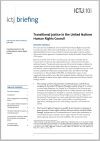The UN Human Rights Council and its mechanisms, notably the system of special procedures, have approached justice for mass atrocities in a piecemeal and sometimes politicized manner, according to a new ICTJ policy briefing.
The briefing, Transitional Justice in the United Nations Human Rights Council, reviews the council’s work relating to transitional justice five years after the council's establishment.
The findings indicate more effective use of a transitional justice framework could strengthen the council's ability to fulfill its mandate to address human rights violations and prevent future abuse. Such a framework addresses the complex legacy of serious human rights abuses with practical strategies that respond to victims’ interests and reinforce human rights-based rule of law, making the council's work more coherent with the approach of the greater UN system.
States, the Office of the High Commissioner for Human Rights, and independent experts should have a comprehensive conversation on how such measures can be effectively integrated into the council’s work.
